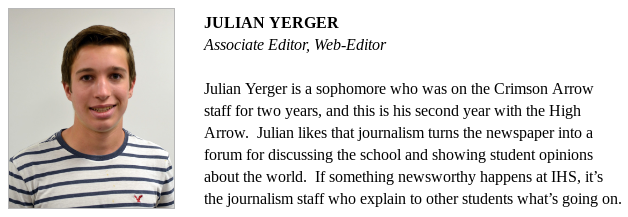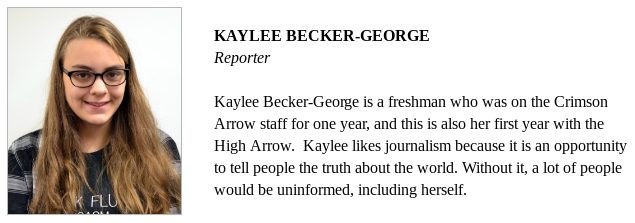As part of the Indiana Gazette’s Newspapers n Education program, three members of the High Arrow staff submitted opinion columns on the topic of gun violence and school shootings, many receiving NIE awards for their efforts. The articles are presented below:
Armed teachers challenge gun violence
By JULIAN YERGER – Just over a month ago, at the Marjory Stoneman Douglas High School in Parkland, FL, a mentally ill former student entered the building and used his assault rifle to kill seventeen people and seriously wound another fourteen. This is certainly not the first school shooting or even the deadliest. Over a dozen have occurred since the beginning of 2018, about 290 since 2013.
Like many before it, this new disaster has energized the gun control debate and brought up a popular solution to the issue: Armed teachers. This idea has been championed by many gun control opponents, but most teachers are far from enthusiastic about carrying a gun in the classroom, and significant training would be required to make them anything more than a liability. Freshman Maddux Fisanich also thought training would be important. “Armed teachers would make me feel safer, but only if they had the proper training and permits.”
On Tuesday, March 13, California teacher Dennis Alexander accidentally discharged his pistol into the ceiling of his classroom. Alexander had his last gun safety training class less than a year ago and worked as a reserve police officer on weekends, so he had received at least as much training as any armed teacher could be expected to have. He had not been cleared to have his weapon at school, but he still decided to draw his weapon and demonstrate to the class how to disarm an assailant. After the weapon discharged, fragments of the bullet and ceiling lodged in one student’s neck, but Alexander did not stop class or inform the school nurse, leaving the student’s parents to take him to the emergency room at the end of the school day.
This accident occurred while the teacher had full control of his weapon, but fighting with a student or active shooter would make the situation much worse. Sophomore Grace Woolslayer said, “I don’t think giving guns to teachers would increase security because even if the teachers were trained, something could go wrong and a student could get the gun. It’s not a good idea to have more guns in the school.” Sophomore Cormac Pagnucci had similar concerns but thought that a full-time security guard would resolve the issue. “Armed security guards are a good idea, but I’m not sure about teachers. If a kid overtook a teacher they may find the gun and use it, which would not be good.”
In the absence of Federal funding, few school districts can afford the extra cost of a security guard, and the armed guard present during the Parkland shooting was too cowardly to engage the shooter. Teachers care about their students and are already positioned where the violence would take place, so armed teachers are a tempting and relatively cheap idea.
Given their potential for misuse, the key issue is whether schools should have guns permanently in the building. In 2012, just after the Sandy Hook shooting, NRA Executive Vice President Wayne LaPierre famously said, “The only way to stop a bad guy with a gun is with a good guy with a gun.” He doubled down on this rhetoric after Parkland, saying “We must immediately harden our schools.” This surprisingly common viewpoint thinks that gun-free zones are natural targets and will inevitably be attacked, but there are many examples of areas with fewer guns having fewer gun attacks.
Compared to Canada and most developed countries in Europe, the US has about 10 times as many guns per capita and about 10 times as many homicides per capita. States with the highest levels of gun ownership have 60 percent higher homicide rates and 7 times higher gun death rates than states with the lowest gun ownership. Homes with firearms have a risk of homicide three times higher than homes without them.
One oft-repeated myth is that criminals will get their hands on a gun regardless of that area’s laws, but Japan is a strong example of laws providing an effective deterrent. Japan has almost completely banned guns from within its borders, including severe restrictions on police usage, and gun deaths have fallen to almost zero. There are harsh prison sentences for the possession of guns, the possession of ammunition, and the firing of a gun, so when all three are charged, the criminal can easily be sentenced to life in prison. Instead of prompting a mass importation of guns, the laws have caused criminals to decide that guns are more trouble than they’re worth.
Even if arming teachers and school personnel would reduce school shootings, the overwhelming majority of gun deaths occur in other ways. In 2017, school shootings killed 43 and wounded 82, while in the same year, there were 15,593 total deaths from gun violence and 31,185 total injuries. 63% of these deaths were suicides, and although it is doubtful that arming teachers would reduce the number of school shootings, the suicide rate would inevitably increase. Judged according to total attempted vs successful suicides, guns are 2.6 times more effective than suffocation, so it’s likely that a large expansion of gun ownership would increase the suicide rate.
Some think that increasing the prevalence of guns will help reduce the new wave of school shootings, but significant evidence says this will be ineffective and have disastrous side effects.

Debating control of guns
By PARKER KOONS – Guns are a very heated topic recently, with many organizations pushing to have more restrictions and/or bans on the manufacture and sale of such. The recent events that happened at the Florida high school have cast a negative light on guns, especially AR-15 style rifles.
There is a large push for more gun control, and even in some cases for the banning of AR-15 rifles altogether by many anti-gun political parties.
“I feel that the banning of military style rifles is an ill-informed and ineffective way to stop the situation. The 1994 assault weapons ban used cosmetic items and differences in weapons to define them as assault weapons, despite the fact that things like adjustable stocks don’t change the mechanics of a gun. Banning assault style weapons will just lead to an increase in the sales of other types of weapons,” comments junior John Harper.
The problem with banning AR-15 rifles is very simple; only the responsible and law abiding citizens will actually turn over their guns, not the criminals or people who commit said atrocities. Guns find their way into criminals hands either way. A very popular fact currently says that England has not had a mass shooting since they enacted harsh civilian gun laws in 1996, following a mass shooting in both Australia and in the UK. Anti-gun political parties have pushed that these countries have not had a mass shooting since this. The truth, however, is that both Australia and the UK have had either a mass shooting or major gun-related crime since their restrictions. England had the Cumbria shooting in which 12 people died.
Another common fact being tossed around is the 18 school shootings this year, which includes accidental firearm discharge by a security guard and also people driving into the school parking lot and committing suicide. This figure comes from a site called “Everytown for Gun Safety,” which is a non-profit that aims to stop gun violence. The organization has come under fire after a closer look at their research shows that many of the supposed school shootings didn’t involve any bodily harm and most did not take place during school hours.
“I think both sides, right and left, are pushing for something they cannot achieve,” Junior Andrew Kimmel says.
“Severe regulations would lead to paranoia and distrust of the government. If the government won’t allow the right to own guns, what else would they not allow?” commented senior Lillian Boone.
Gun control is important, but in the right amounts. Guns can be an important way of life for some people; some people rely on them for food, and some provide home defense, and many people have been saved simply by the act of pumping a shotgun.
Military style rifles make little sense in civilian hands however due to having no need for them or any common reason. In the long run, the gun control debate is far from over but there is hope for more common sense on both sides of the spectrum.

School shootings are scary, and can we take more effective measures to prevent them?
By KAYLEE BECKER-GEORGE – Our country has been devastated by school shootings, and as a freshman in high school, it can be terrifying to get up and go to school every day. That brings up the questions: why are these tragedies happening, and what can we do to prevent them?
On March 14, a group of about 60 students gathered during fourth period in the new gym and discussed what they believe could be done about the school shootings, and how they felt about gun control in general.
It was an educational debate and many believed in stricter gun laws, which might work. I believe that the big problem in America is not only access to guns, and it is being discussed less often than most of the other topics.
One of the big problems that is being addressed in the shadows is the mental state of our country. Freshman Dustin Miller says, “I think that mental health does need to be addressed just as much as access to guns.”
I have seen so much about gun control, and maybe one or two articles mention the mental health of the person who did the shooting. The thing is, if a mentally ill person wants to cause violence in a school, the lack of a gun will not stop the person. They will find some way to do it.
It is said that the shooter in Florida played video games, which seems to be another focus. Now, as someone who does play violent video games, I can personally attest to the fact that this does not make every single child who picks up a controller a potential murderer.
Now, I must tell a little bit of a story to make sure my point gets across. Growing up, I was allowed to play Call of Duty, which is a game franchise dedicated to semi-realistic war simulations. Most of the time I was playing with my parents. In these games, players are awarded points for killing the other players in game, and receive something called a K/D, which is a kill to death ratio. It determines how many kills you got versus how many times you died. To win, your team has to get more kills than the other team. It is a very violent game, undoubtedly.
However, my parents would not let me watch documentaries on Hitler at that age. I asked my father about this, and he said that he would not let me watch those documentaries at that age because he didn’t want my young mind seeing such real violence at that age, and connecting it to the games I was playing.
Now, note that I have brought up my parents thrice so far. That’s because parents play a huge part in whether or not children can grow up to be potentially dangerous to others. Many people say that you can’t blame a parent for their child’s actions, but why not? They raise that person, and as their child’s mind is developing and taking in the information they are seeing, the parents should always make sure to establish boundaries, a proverbial line, if you will. Making sure that they know what’s wrong and what’s right; what’s real and what’s fiction. Freshman Andre Rubinstein says, “Parenting definitely plays a large part in who kids grow up to be.”
Mental health should be more carefully monitored, but it doesn’t have to be done by a psychiatrist. It should be done by parents, guardians, and teachers. Of course, there can be other problems.
As Freshman Leiloni Dallas says, “I think that bullying also plays a large part in whether or not children are driven to violence.” Bullying can lead students to do violent things, but this ties back to the mental health issues. Picking up on these warning signs at a young age will help to potentially stop the problem before it is too late.
I do believe that the people who purchase guns should have more extensive background checks, but I really hope that people take notice of the fact that mental illness is playing a very big part in what’s happening to our country and put in measures to help take care of this situation before another calamity befalls the United States.


[Photo by Kayla Stewart]
Photo Caption: “A group of about 60 students gathered in the auditorium on March 14th to talk about the school shootings and pay respect.”
